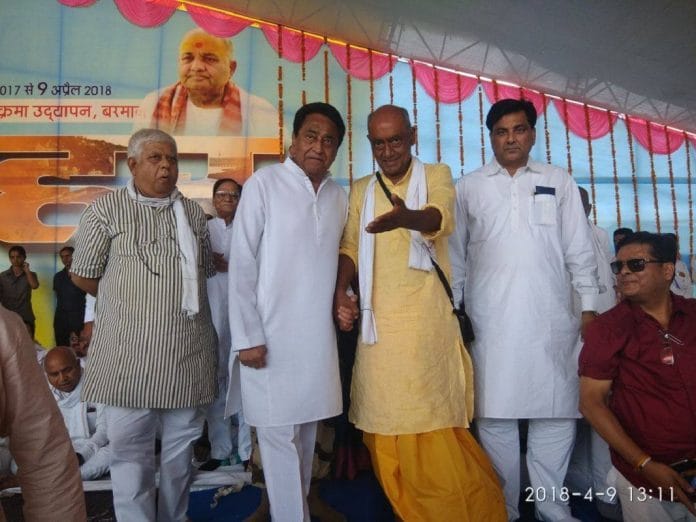Kamal Nath-led state party unit effects structural grassroots changes to tackle BJP’s organisational strength; Digvijaya Singh gives unity tough talk.
Bhopal: The Congress seems to have taken a few leaves out of BJP president Amit Shah’s book in its attempts to ensure a ‘BJP-mukt’ Madhya Pradesh, a state where the saffron party has been in power for 15 years.
In an overhaul of the party’s lower rungs in the state, Madhya Pradesh Congress president Kamal Nath is reading the riot act to office-bearers who presided over the party’s decay. He has already sacked 20 of the 51 district Congress committee (DCC) presidents and 10 more are set to be replaced soon, said his close aides.
His colleague and Congress coordination committee chief Digvijaya Singh has embarked on an ekta yatra (unity march) to unite workers and leaders of his faction-ridden unit and get them into action ahead of the assembly elections in November-December.
While Amit Shah’s sampark for samarthan (contact for support) with Madhuri Dixit in Mumbai made headlines early this month, Singh met with the ‘dancing uncle’ — Professor Sanjeev Srivastava — who suddenly finds himself in the league of celebrities after his video went viral. Singh met Srivastava at the latter’s house in Vidisha a week later. His father, Deven Srivastava, is an old Congressman.
Structural changes in the offing
To combat the BJP’s organisational strength, Nath told ThePrint that the Congress would effect changes right from the grassroots level.
“There is a shortage of time. We have to structurally strengthen the party at the village and block levels. What we are combating is the BJP’s organisational strength. Campaigns (by themselves) can’t build the atmosphere. You must have the organisation right down to the village level,” he said.
After removing the dead wood from the DCCs, next on Nath’s priority list is the appointment of working DCC presidents, with due representation to different castes, and the setting up of booth-level committees. Among the structural changes being introduced by the party is the creation of sectors (for every 10-15 polling booths) on the lines of the BJP’s shakti kendras and mandalams (for 2-3 sectors).
“The Congress party’s problem has been that its contact with the people at the grassroots gradually diminished over the past 10 years. And so the BJP has been able to spread propaganda about its achievements. But things are changing in the Congress now. Kamal Nath is a very good choice,” said Pratap Bhanu Sharma, a veteran Congressman from Vidisha, who was close to the Scindia family until recently. Singh called on him last Wednesday and the latter has been raring to go since then.
Congress unity, or semblance of it, in MP
What seems to be working for the Congress this time is a semblance of unity in the party, the absence of which had helped the BJP win three consecutive assembly elections. Traditionally faction-ridden, the Congress in Madhya Pradesh is today split into at least five groups led by Singh, Kamal Nath, Jyotiraditya Scindia, Suresh Pachouri and Arun Yadav.
Singh is the tallest among them, given that others’ influence is limited to particular pockets and regions. But after the former chief minister threw his political weight behind Nath, other factions have started giving in, said a Congress insider.
Singh, chief of the coordination committee, is certainly the right choice for the job.
In 1990, when he was given the reins of the state unit by Rajiv Gandhi, Congressmen were bitterly split in their loyalty to the then party veterans — Arjun Singh, the Shukla brothers, Madhavrao Scindia, and Subhash Yadav, to name a few.
Singh convened a closed-door meeting of senior party office-bearers and candidly told them that each of them, including him, was there only to protect the interest of their respective patrons. “So why fight among ourselves. I will see to it that our netas’ interests are taken care of,” said Singh.
That was the first meeting in a long time that ended without any manhandling or violence outside the party office. In 1993, Nath actively supported Singh’s candidature for the chief minister’s post, a favour the latter has returned 25 years later.
The next six months will show whether this semblance of unity in the Congress is permanent or temporary. But the bigger challenge for the party is what Dhiraj Meena, a Bhopal Polytechnic college student from Sadanandpur in Raisen district, seemed to suggest to ThePrint. He plans to go to Mumbai after completing the course because there is “no job, no factory” in the state. But he still finds Shivraj Singh Chouhan a “good CM”, refusing to elaborate why. Do you find any Congress leader good? “What about Congress leaders!” he said, visibly upset by the apparent irrelevance of the question.






